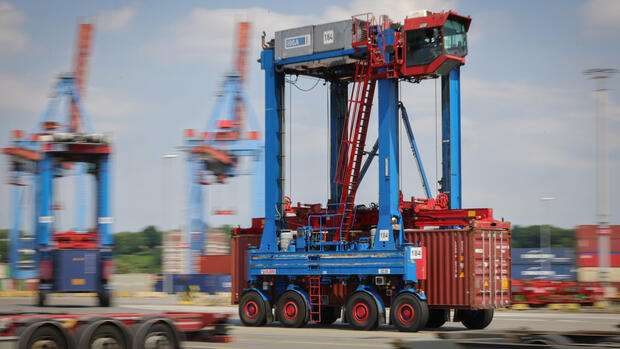Subdued foreign demand is weighing on the German economy.
(Photo: dpa)
Brussels The economy in Europe continues to weaken and Germany is even threatened with a recession. This is shown by the EU Commission’s new growth forecast: According to this, the German economy will shrink by 0.4 percent this year and will only recover slowly next year with growth of 1.1 percent.
Across Europe, the EU expects a slight economic increase of 0.8 percent in 2023. In the spring she had predicted one percent growth. Next year, at 1.4 percent, progress for the entire EU is expected to be slower than previously expected. Developments in Germany are primarily responsible for this.
The declining economic momentum is accompanied by falling inflation figures: According to the forecast, the inflation rate in the EU will halve from 6.5 percent in the current year to 3.2 percent in the coming year. For the euro area, the inflation estimates are 5.8 percent in 2023 and 2.9 percent in 2024. However, they are still well above the European Central Bank’s 2 percent target.
Germany is at the bottom of the pack in Europe: No other major EU nation has to expect negative growth in 2023. Some German economic institutes fear an even greater economic downturn. The Leibniz Institute for Economic Research (RWI) in Essen, for example, predicts a decrease in gross domestic product (GDP) of 0.6 percent.
The EU Commission cites real wage losses, which put a strain on private consumption, as the reason for the German economic crisis. “In addition, the weak dynamics of foreign demand led to subdued exports,” says the Brussels economic report.
Read here: The German economy is expected to shrink in 2023
Unlike in previous weak phases, Germany cannot save itself from the crisis with the help of a strong export economy. China in particular, an important market for German companies, is struggling with a slowing economy.
Weak growth in the coming year
The EU figures underline how far the Federal Republic is from the new economic miracle that Chancellor Olaf Scholz (SPD) promised six months ago. For a long time, Germany was Europe’s growth driver, but now it is the EU’s biggest worry.
EU economists attribute the fact that the German economy is expected to grow only weakly and less than forecast in the coming year to the slowing construction sector – a consequence of the ECB’s interest rate increases.
The EU also highlights the dwindling confidence in manufacturing. “This was particularly pronounced in the energy-intensive industries,” writes the Commission. A comment that should give new impetus to the German debate about an industrial electricity price.
Only last week, at joint meetings in Brussels, the heads of government of the German federal states spoke out in favor of temporarily offering large industrial companies a reduced electricity price.
Read here: German Prime Ministers demand industrial electricity prices in Brussels
However, the traffic light coalition in Berlin does not agree. The Green Economics Minister Robert Habeck had proposed the industrial electricity price, but has so far been unable to convince either Chancellor Scholz or Finance Minister Christian Lindner (FDP) of his concept.
The EU Commission is also skeptical: it fears that the bridge electricity price will become a permanent subsidy that distorts competition in Europe.
More: “We cannot permanently subsidize energy”


